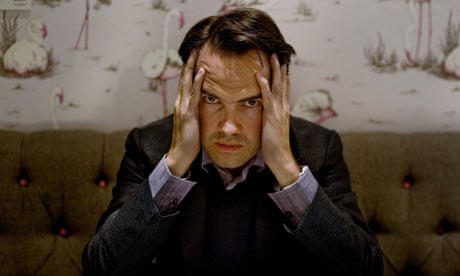I have interviewed performers after a show but never, as far as I recall, during it. Most prefer to use the interval to relax, but not comedian Jimmy Carr. He has just spent an hour amusing a Sunday-night audience at the Winter Gardens in Margate with several hundred rapid-fire jokes, and will do so again in the second half, but still I am whisked into his dressing room where, shinily made up, bright-eyed, intense, inexhaustible, Carr is happy to be cross-examined. He asks the technical manager for some hot water – I never do find out why – and then sits down next to me to answer questions.
Or, rather, one question. This meeting is a sequel to a long conversation we had a couple of weeks earlier in a trendy private members' club for creative types in Soho – about as far from the Margate Winter Gardens as you could imagine. I'd always intended to come to Margate to see the show, part of his 10-month, 100-date tour, but this supplementary meeting is necessary because of the metaphorical hot water he was plunged into following a gig in Manchester on October 23 where he told that joke.
OK, here goes (apologies if you've heard it before and don't want to hear it again): "Say what you like about those servicemen amputees from Iraq and Afghanistan, but we're going to have a fucking good Paralympic team in 2012." Pretty much standard-issue Jimmy Carr: tasteless, offensive, short, targeting disability – one of his key subjects alongside rape, paedophilia, prostitutes, homosexuality, Aids, the physical and sexual abuse of pets, sex of all kinds (but especially anal), penises, breasts, vaginas ("Where did you lose your virginity?" someone in the audience at Margate asks him. "In a vagina," he fires back), excrement, the awfulness of the Welsh, the even greater awfulness of the Scots, fat women, fat children, fat pets, fat Scots, and people (fatness optional) with ginger hair.
What was exceptional was the backlash. "TV comic's slur on amputee soldiers," screamed the Sunday Express on its front page; "Families' anger at Jimmy Carr's 'disgraceful' joke about war hero amputees," countered the Mail on Sunday. The "disgraceful" came courtesy of the former commander of British forces in Afghanistan; the families of wounded soldiers were vituperative; the defence secretary was said to be furious; Liam Fox for the Conservatives was incandescent; even the prime minister's office made a statement. Carr issued a qualified apology. "I'm sorry if anyone was offended, but that's the kind of comedy I do. If a silly joke draws attention to the plight of these servicemen, then so much the better. My intention was only to make people laugh."
Tonight in Margate is the first time he has talked about the furore. I wonder, as I sit down on the dressing-room sofa, whether I should ease my way in. But he introduces the subject straightaway.
"I've had some controversy in the papers," he says, in case I'd missed it. "It was really genuinely stressing." This surprises me. He doesn't strike me as easily stressed. But then he explains: "Radio stations and newspapers were phoning up the mothers of soldiers who'd been killed or injured fighting for their country, telling them a joke down the phone, and saying, 'What do you think of this?' I can't think of anything more inappropriate."
Carr says the storm was concocted by the media. "I played to 9,000 people that weekend. I did Manchester and Stockport, and two people complained. My audience aren't offended, but this other audience that reads the papers are offended. They're totally entitled to be offended by those kind of jokes, but they're normally not exposed to those kind of jokes. I know what the rules are on TV – what you can and can't say. There are a hundred jokes in the show that are worse than that, so if you want to be offended you can find a lot of stuff."
He does not repeat the joke in Margate tonight, though some in the audience are goading him to do so. He makes do with noting the fact that no one watches the Paralympics anyway, and a few throwaway jokes about people without arms. Why not do the controversial joke? "I thought I'd leave it," he says. "Otherwise it looks like you haven't taken it [the furore] seriously. I didn't write the joke and think, 'That's an unacceptable joke, that's an unacceptable thing to say, but will I get away with it?' I thought it was a totally acceptable joke and a point to make, but now it's become something else. The other reason not to tell it now is that people have heard it." He is wearing a poppy tonight, and admits he has put it on a week earlier than usual.
Carr, who has in the past visited injured soldiers in hospital and at the Headley Court rehabilitation centre in Surrey, reckons the squaddies themselves are on his side. "If you look at the young men and young girls who come to my gigs, a proportion are in the armed forces." His defenders say his black humour precisely mirrors that of the troops, who have to laugh in the face of possible injury or death. So does he feel he was unfairly turned over by the tabloids and bandwagon-jumping politicians? "No, I think it's fair enough," he says. "I think it was my turn. I've been telling these kind of jokes for 10 years, and it could have been any one of a hundred jokes that became a cause celebre. I think there's a climate out there."
I try to get him to expand on his "climate" comment, but he says he's not "qualified" to talk about it – an odd remark, since if a comedian can't talk about it, who can? But there does appear to be a growing campaign against so-called "edgy" comedy – witness the attacks on Jonathan Ross and Russell Brand for their hounding of Andrew Sachs, and on Frankie Boyle for his remarks about the swimmer Rebecca Adlington. Boyle, who has written for Carr's Channel 4 game show Distraction, quit the BBC show Mock the Week recently in protest at the producers' preference for "light, frothy stuff" and unwillingness to "frighten the horses". Battle lines are being drawn, and the issue has even been aired on Newsnight. The c-word that comics worry about these days is compliance.
Carr makes no clever defence of his joke. "There is a tendency, when someone is upset, to say, 'Well, I was highlighting the tragedy.' I wasn't. I was trying to make people laugh." He says this almost in the manner of one of his jokes. Languid first sentence to set it up. Rapid middle sentence. Punchline. Carr seems to think in comic constructions.
I ask him whether he thought it odd that the prime minister's office got involved. "I think it is, but I don't know who fuels that fire," he says. "The great thing about comedy is it's not accountable. Is there a prefect of comedy that decides what can and can't be said? It wasn't broadcast. People came to the gig, and two people out of 9,000 that weekend – and I've told it to 100,000 people so far on the tour – said, 'I didn't pay to hear this kind of rubbish.' But they did pay to hear that: they paid to be in that room with that group of people. They found one joke offensive because it applied to them [he thinks they had a friend or family member who had been wounded], but everything else in the show that was horribly offensive they laughed at."
I have also been told to take Carr to task because of his fondness for rape jokes. There are plenty of those in evidence at Margate, including one near the end of the show: "What's the difference between football and rape? Women don't like football."
That, I would say, is more offensive than the army joke, yet no one seems to take offence. In fact, after the show there's a 300-strong line of fans – many of them young women – queueing up for him to sign tickets, programmes and DVDs. Several of them are extremely fat, but seem to have taken his obesity jokes in good heart. The burly security guards on either side as he shakes hands and signs at a little table are not called on.
Carr has played the Winter Gardens every year for the last four, and he greets some of his fans as if they were old friends. There is even a soldier in the line who is off to Afghanistan next week. "He said, 'I thought it [the controversial joke] was funny. Will you sign this for the lads?'" Carr tells me when every hand has at last been shaken, every camera-phone picture taken.
I had brought up Carr's fondness for rape jokes at our initial get-together in the Soho club, and thought he might go on the defensive. I couldn't have been more wrong. "I do a lot of jokes about rape," he admits, "but it's not a discourse on rape. I do jokes to get laughs. I happen to think the construct of '99% of women kiss with their eyes closed, which is why it's so difficult to identify a rapist' is funny. It's not really about the act of a serious sexual assault. You have to go out of your way to take offence over, 'I bought a rape alarm because I kept on forgetting when to rape people.'
"If a friend of yours was raped and your reaction to that news was jovial, you're mental. But the context is, you're on stage, it's about making people laugh, and it's about the world we live in. I'm just an entertainer, but things have moved on and it can't all be about nice stuff. My favourite noise in comedy is the laugh followed by the sharp intake of breath."
Is there any subject he wouldn't touch? "No is the short answer," he says after a moment's hesitation, "if it was funny enough. If you come up with a joke about something that's uncomfortable to talk about – abortion, there's a good example – it's not a difficult moral decision not to do the joke if it isn't that funny. But if you come up with a joke about abortion and you tell it to your friend, and your friend goes, 'Oh my God, you can't say that on stage – but that is fucking wicked,' then suddenly morals go out of the window and you go, 'We're definitely doing that.'"
Carr says he treats the audience which comes to his gigs as he would his friends. "There's no difference between the jokes I would tell out there on the stage and the jokes I would tell to my friends in the pub. There's no edit."
I tell him I got a lot of negativity from people when I mentioned we were going to meet. Does that bother him? "It does," he says, not entirely convincingly. "There's a weird paradox in comedy. People who get into it desperately want to be liked. It's almost a personality disorder. There's a big hole in me that means I go out 200 times a year and talk to strangers, and crave their approval. And I'm the only one in that room facing the wrong way. There's something odd about that. But the paradox is that while you crave approval, if you've got any sense you also realise that a sense of humour is never universal. You're always preaching to the choir: at this stage, people come to the show because they like your sense of humour."
He thinks some people who object are being hypocritical. "Sometimes people get offended on behalf of other people, and you think, 'You know what, don't be a dick.' You often get people coming up and saying, 'I'm just playing devil's advocate here, but I think some people – not me because I get it – could take that the wrong way.' And you say, 'What, some fucking idiots? There are no idiots at the show. It's fine. Don't worry about it.'"
Carr sees himself primarily as a technician. He writes his own stand-up material, and reckons to write at least one joke every day. Doesn't he aspire to be an artist? Won't he get bored telling jokes in Margate for several decades? No is the firm answer to both questions.
"The question I really dread in interviews is, 'Well, what next? What about the sitcom? You don't say that to anyone else with a job. You don't meet a fireman and go, 'Right, you've been a fireman for a few years. What next?' I'm happy. I like this life. I like travelling round the country and writing my jokes. I sound a bit special-needs now. I can write jokes: that's what I've got. If I was an incredible violinist on the side, I'm sure I'd be incredibly frustrated, but I'm not."
The day before we meet in Soho, the Guardian had given his performance at the Cliffs Pavilion, Southend, a two-star review, referring to Carr's "smooth cynicism". "I take that as a compliment," he says. "Really, genuinely. Also, you know what, the Southend gig was always going to be rough."
Even after three hours with Carr, I don't have much idea what makes him tick. He is smart, that's for sure, was a star at school, went to Cambridge, has immense verbal dexterity, which is the key to many of his jokes. One critic said his jokes had the formal perfection of a haiku. I don't think the critic was a woman.
Carr was a Christian until his 20s but has now – under the influence of Richard Dawkins and a friend at college – turned on God with a vengeance. He was very close to his mother, who died of pancreatic cancer in 2001. ("It was a brutal time," he says, "slow and unremittingly bleak.") After her death, he and his elder brother fought a very public battle with their father over their younger sibling, who had chosen to live with his brothers.
In his mid-20s, Carr says, he was so unhappy he could hardly get out of bed. He was a virgin until he was 26 ("it was a weird thing"), hated his job in the marketing department at Shell, chucked it in and turned to comedy (and therapy) instead. He reconstructed his life, with comedy as its driving force.
Now, at 37, he is wealthy, in a long-term relationship with a Canadian-born TV executive called Karoline (Any chance of children? I ask. "You can't have kids the way we do it") and lives in trendy Islington. Despite his non-PC stage persona, he calls himself an "uber-liberal", and when someone in the Margate audience asks him a dubious question about immigration, he avoids making a joke and says he thinks immigration is a good thing.
As I'm leaving the Winter Gardens, I see his Bentley coming out of the car park. I wonder if he sees me, but there is no acknowledgment. Tomorrow he will be in Birmingham, with another couple of thousand close friends, then on to Wolverhampton and Stoke. Just don't ask him where he goes from there.
Jimmy Carr's latest DVD, Telling Jokes, is released this week. His tour continues until June 2010. Details on jimmycarr.com



